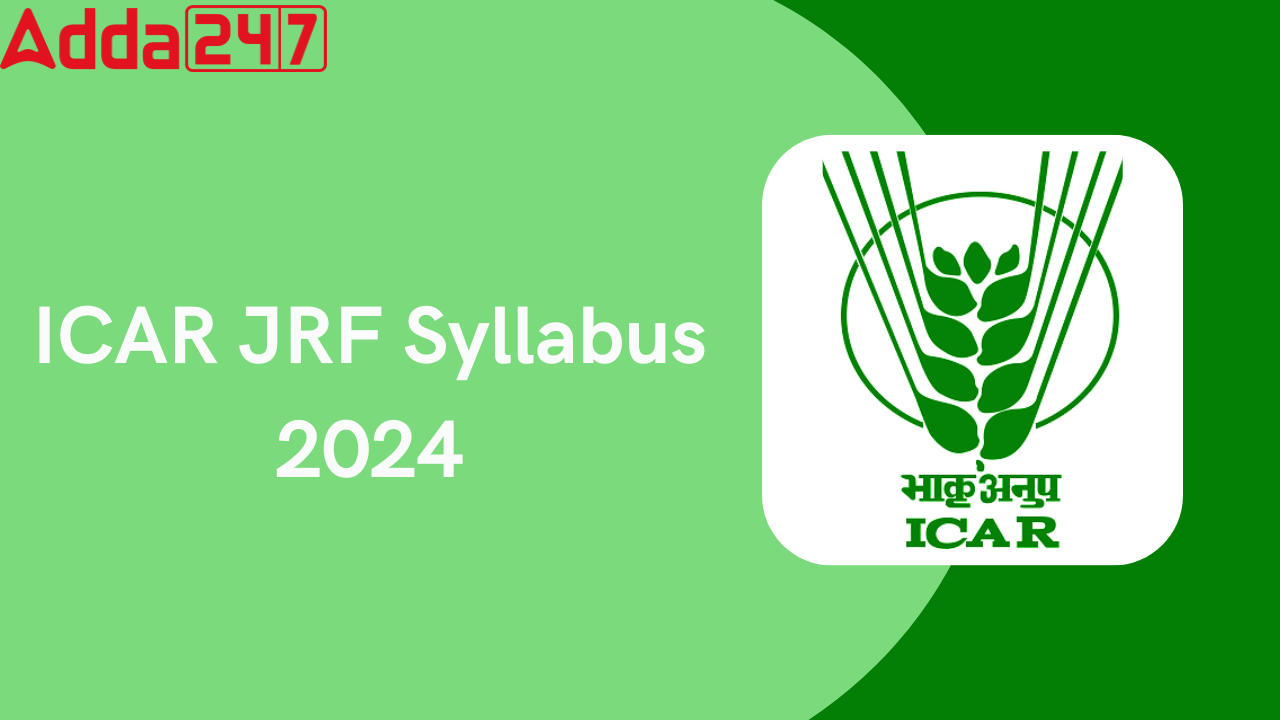Table of Contents
ICAR JRF Syllabus 2024
The ICAR Junior Research Fellowship (JRF) 2024 exam is a crucial step for candidates aspiring to pursue advanced research in agriculture and related fields. The syllabus and exam pattern for ICAR JRF 2024 are designed to assess candidates’ knowledge and understanding across various agricultural disciplines. This comprehensive guide provides detailed insights into the subject-wise syllabus and the exam pattern, helping candidates effectively prepare for the exam. Understanding the syllabus and exam structure is essential for focusing your studies on relevant topics and maximizing your chances of success.
ICAR JRF Exam Pattern
The ICAR JRF Exam Pattern for 2024 provides essential details regarding the structure and format of the exam. This computer-based test, administered by the NTA, includes multiple-choice questions (MCQs) covering various scientific disciplines. Candidates will have 120 minutes to answer 120 questions, with the option to choose between Hindi and English versions of the test.
To excel, applicants should thoroughly review this exam pattern and align their preparation strategies accordingly. Understanding the allocation of marks and the types of questions will help in effectively managing time and focusing on key areas during preparation. For a competitive edge, it’s crucial to familiarize yourself with the ICAR UG Exam Pattern, as it shares similarities with the JRF exam.
| Exam Pattern Overview | |
| Exam name | AIEE/AICE |
| Streams involved | PCB, PCM, ABC, and PCA |
| Mode of Exam | Online |
| Duration of Exam | 120 Minutes |
| Medium of Exam | English and Hindi |
| Total Marks | 480 |
| Total Questions | 120 |
| Marking Scheme | +4 for the correct answer and -1 for the incorrect answer |
| Official Website | https://icar.nta.ac.in/ |
ICAR JRF Exam Pattern 2024 Marking Scheme
The marking scheme for the ICAR JRF Exam is outlined as follows: Candidates will earn four marks for each correct answer and lose one mark for each incorrect response. The total score for the ICAR JRF test is 480 points. For detailed information on how the scoring works, please refer to the table provided below.
| ICAR JRF Exam Marking Scheme | ||
| Section | Questions | Marks |
| Section A | 20 | 80 |
| Section B | 50 | 200 |
| Section C | 50 | 200 |
| Total | 120 | 480 |
ICAR JRF Syllabus
To effectively prepare for the ICAR JRF Exam, applicants must be well-acquainted with the syllabus. A well-structured study plan, based on the syllabus, is essential for successful exam preparation. The ICAR JRF Syllabus PDF is available on this page to assist candidates in their study efforts. Familiarizing yourself with the ICAR JRF syllabus will help you excel and stand out from other candidates. The syllabus covers a range of subjects including Physics, Chemistry, Mathematics, Biology, and Agriculture. It is important to study each topic listed in the ICAR JRF Syllabus thoroughly to ensure comprehensive preparation.
1. Physics
- Physical World and Measurement
- Kinematics
- Laws of Motion
- Work, Energy, and Power
- Gravitation
- Properties of Bulk Matter
- Dual Nature of Matter and Radiation
- Thermodynamics
- Atoms & Nuclei
- The behavior of Perfect Gas and Kinetic theory
- Oscillations and Waves
- Electronic Devices
2. Chemistry
- Some Basic Concepts of Chemistry
- Solid State
- Hydrocarbons (Classification of Hydrocarbons)
- Electrochemistry
- Solutions
- Chemical Kinetics
- Structure of Atom
- Surface Chemistry
- Classification of Elements and Periodicity in Properties
- General Principles and Processes of Isolation of Elements
- Chemical Bonding and Molecular Structure
- p-Block Elements (Group 15 elements)
- States of Matter: Gases and Liquids
- Equilibrium
- Redox Reactions
- d and f Block Elements
- Preparation and Properties of Some Important Compounds
- Alcohols, Phenols, and Etders
- Organic Chemistry (Some Basic Principles and Techniques)
3. Biology
- Living World
- Unit of Life
- Diversity of Life
- Organisms and Environment
- Multicellularity: Structure and Function – Plant Life
- Multicellularity: Structure and Function – Animal Life
- Continuity of Life
- Origin and Evolution of Life
- Application of Biology
4. Mathematics
- Sets and Functions
- Algebra
- Coordinate Geometry
- Calculus
- Vectors and three-Dimensional Geometry
- Linear Programming
- Mathematical Reasoning
- Statistics & Probability
- Statics
- Dynamics
5. Agriculture
- Genetics and Plant Breeding
- Seed Science and Technology
- Economic Botany and Plant Genetic Resource
- Plant Pathology
- Nematology
- Agricultural Entomology
- Sericulture
- Plant Biochemistry
- Plant Physiology
- Agricultural Biotechnology
ICAR PG Syllabus
Candidates preparing for the ICAR AIEEA exam should closely follow the official ICAR PG exam syllabus to ensure effective study. The ICAR website provides the complete syllabus for the PG exam, helping candidates focus their preparation on relevant topics and avoid spending time on unnecessary material. Refer to the syllabus provided below to guide your study and maximize your preparation efficiency.
- Plant Biotechnology
- Plant Sciences
- Physical Science
- Entomology and Nematology
- Agronomy
- Social Sciences
- Statistical Sciences
- Horticulture
- Forestry
- Agricultural Engineering and Technology
- Water Science and Technology
- Animal Biotechnology
- Veterinary Science
- Animal Science
- Fisheries Science
- Dairy Science
Effective Preparation Strategies
- Recognize the Exam Format and Syllabus: Understand the ICAR AIEEA exam format and syllabus thoroughly. Familiarize yourself with the types of questions, their format, time constraints, and scoring system.
- Create a Study Plan: Develop a detailed study plan outlining the subjects to be covered, study durations, and key milestones to stay organized and focused.
- Practice Exams: Take as many ICAR AIEEA practice exams as possible to gauge the difficulty level and familiarize yourself with the types of questions you may encounter.
- Time Management: Effective time management is crucial for success. Allocate sufficient time for each section and practice answering questions within the allotted time.
- Revise Frequently: Regular revision helps reinforce your understanding and improves problem-solving speed. Make sure to review topics frequently to stay sharp.




 MPPSC FSO Recruitment 2025 Cancelled, Ne...
MPPSC FSO Recruitment 2025 Cancelled, Ne...
 BPNL Recruitment 2025 Notification Out, ...
BPNL Recruitment 2025 Notification Out, ...
 MPSC Livestock Development Officer Recru...
MPSC Livestock Development Officer Recru...


 Adda247 Job portal has complete information about all Sarkari Jobs and Naukri Alerts, its latest recruitment notifications, from all state and national level jobs and their updates.
Adda247 Job portal has complete information about all Sarkari Jobs and Naukri Alerts, its latest recruitment notifications, from all state and national level jobs and their updates.